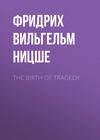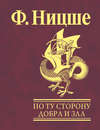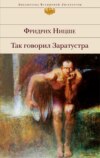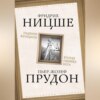Czytaj książkę: «The Birth of Tragedy»
INTRODUCTION. 1
Frederick Nietzsche was born at Röcken near Lützen, in the Prussian province of Saxony, on the 15th of October 1844, at 10 a.m. The day happened to be the anniversary of the birth of Frederick-William IV., then King of Prussia, and the peal of the local church-bells which was intended to celebrate this event, was, by a happy coincidence, just timed to greet my brother on his entrance into the world. In 1841, at the time when our father was tutor to the Altenburg Princesses, Theresa of Saxe-Altenburg, Elizabeth, Grand Duchess of Olden-burg, and Alexandra, Grand Duchess Constantine of Russia, he had had the honour of being presented to his witty and pious sovereign. The meeting seems to have impressed both parties very favourably; for, very shortly after it had taken place, our father received his living at Röcken "by supreme command." His joy may well be imagined, therefore, when a first son was born to him on his beloved and august patron's birthday, and at the christening ceremony he spoke as follows: – "Thou blessed month of October! – for many years the most decisive events in my life have occurred within thy thirty-one days, and now I celebrate the greatest and most glorious of them all by baptising my little boy! O blissful moment! O exquisite festival! O unspeakably holy duty! In the Lord's name I bless thee! – With all my heart I utter these words: Bring me this, my beloved child, that I may consecrate it unto the Lord. My son, Frederick William, thus shalt thou be named on earth, as a memento of my royal benefactor on whose birthday thou wast born!"
Our father was thirty-one years of age, and our mother not quite nineteen, when my brother was born. Our mother, who was the daughter of a clergyman, was good-looking and healthy, and was one of a very large family of sons and daughters. Our paternal grandparents, the Rev. Oehler and his wife, in Pobles, were typically healthy people. Strength, robustness, lively dispositions, and a cheerful outlook on life, were among the qualities which every one was pleased to observe in them. Our grandfather Oehler was a bright, clever man, and quite the old style of comfortable country parson, who thought it no sin to go hunting. He scarcely had a day's illness in his life, and would certainly not have met with his end as early as he did – that is to say, before his seventieth year – if his careless disregard of all caution, where his health was concerned, had not led to his catching a severe and fatal cold. In regard to our grand-mother Oehler, who died in her eighty-second year, all that can be said is, that if all German women were possessed of the health she enjoyed, the German nation would excel all others from the standpoint of vitality. She bore our grandfather eleven children; gave each of them the breast for nearly the whole of its first year, and reared them all It is said that the sight of these eleven children, at ages varying from nineteen years to one month, with their powerful build, rosy cheeks, beaming eyes, and wealth of curly locks, provoked the admiration of all visitors. Of course, despite their extraordinarily good health, the life of this family was not by any means all sunshine. Each of the children was very spirited, wilful, and obstinate, and it was therefore no simple matter to keep them in order. Moreover, though they always showed the utmost respect and most implicit obedience to their parents – even as middle-aged men and women – misunderstandings between themselves were of constant occurrence. Our Oehler grandparents were fairly well-to-do; for our grandmother hailed from a very old family, who had been extensive land-owners in the neighbourhood of Zeitz for centuries, and her father owned the baronial estate of Wehlitz and a magnificent seat near Zeitz in Pacht. When she married, her father gave her carriages and horses, a coachman, a cook, and a kitchenmaid, which for the wife of a German minister was then, and is still, something quite exceptional. As a result of the wars in the beginning of the nineteenth century, however, our great-grandfather lost the greater part of his property.
Our father's family was also in fairly comfortable circumstances, and likewise very large. Our grandfather Dr. Nietzsche (D.D. and Superintendent) married twice, and had in all twelve children, of whom three died young. Our grandfather on this side, whom I never knew, must certainly have been a distinguished, dignified, very learned and reserved man; his second wife – our beloved grandmother – was an active-minded, intelligent, and exceptionally good-natured woman. The whole of our father's family, which I only got to know when they were very advanced in years, were remarkable for their great power of self-control, their lively interest in intellectual matters, and a strong sense of family unity, which manifested itself both in their splendid readiness to help one another and in their very excellent relations with each other. Our father was the youngest son, and, thanks to his uncommonly lovable disposition, together with other gifts, which only tended to become more marked as he grew older, he was quite the favourite of the family. Blessed with a thoroughly sound constitution, as all averred who knew him at the convent-school in Rossleben, at the University, or later at the ducal court of Altenburg, he was tall and slender, possessed an undoubted gift for poetry and real musical talent, and was moreover a man of delicate sensibilities, full of consideration for his whole family, and distinguished in his manners.
My brother often refers to his Polish descent, and in later years he even instituted research-work with the view of establishing it, which met with partial success. I know nothing definite concerning these investigations, because a large number of valuable documents were unfortunately destroyed after his breakdown in Turin. The family tradition was that a certain Polish nobleman Nicki (pronounced Nietzky) had obtained the special favour of Augustus the Strong, King of Poland, and had received the rank of Earl from him. When, however, Stanislas Leszcysski the Pole became king, our supposed ancestor became involved in a conspiracy in favour of the Saxons and Protestants. He was sentenced to death; but, taking flight, according to the evidence of the documents, he was ultimately befriended by a certain Earl of Brühl, who gave him a small post in an obscure little provincial town. Occasionally our aged aunts would speak of our great-grandfather Nietzsche, who was said to have died in his ninety-first year, and words always seemed to fail them when they attempted to describe his handsome appearance, good breeding, and vigour. Our ancestors, both on the Nietzsche and the Oehler side, were very long-lived. Of the four pairs of great-grandparents, one great-grandfather reached the age of ninety, five great-grandmothers and-fathers died between eighty-two and eighty-six years of age, and two only failed to reach their seventieth year.
The sorrow which hung as a cloud over our branch of the family was our father's death, as the result of a heavy fall, at the age of thirty-eight. One night, upon leaving some friends whom he had accompanied home, he was met at the door of the vicarage by our little dog. The little animal must have got between his feet, for he stumbled and fell backwards down seven stone steps on to the paving-stones of the vicarage courtyard. As a result of this fall, he was laid up with concussion of the brain, and, after a lingering illness, which lasted eleven months, he died on the 30th of July 1849. The early death of our beloved and highly-gifted father spread gloom over the whole of our childhood. In 1850 our mother withdrew with us to Naumburg on the Saale, where she took up her abode with our widowed grandmother Nietzsche; and there she brought us up with Spartan severity and simplicity, which, besides being typical of the period, was quite de rigeur in her family. Of course, Grand-mamma Nietzsche helped somewhat to temper her daughter-in-law's severity, and in this respect our Oehler grandparents, who were less rigorous with us, their eldest grandchildren, than with their own children, were also very influential. Grandfather Oehler was the first who seems to have recognised the extraordinary talents of his eldest grandchild.
From his earliest childhood upwards, my brother was always strong and healthy; he often declared that he must have been taken for a peasant-boy throughout his childhood and youth, as he was so plump, brown, and rosy. The thick fair hair which fell picturesquely over his shoulders tended somewhat to modify his robust appearance. Had he not possessed those wonderfully beautiful, large, and expressive eyes, however, and had he not been so very ceremonious in his manner, neither his teachers nor his relatives would ever have noticed anything at all remarkable about the boy; for he was both modest and reserved.
He received his early schooling at a preparatory school, and later at a grammar school in Naumburg. In the autumn of 1858, when he was fourteen years of age, he entered the Pforta school, so famous for the scholars it has produced. There, too, very severe discipline prevailed, and much was exacted from the pupils, with the view of inuring them to great mental and physical exertions. Thus, if my brother seems to lay particular stress upon the value of rigorous training, free from all sentimentality, it should be remembered that he speaks from experience in this respect. At Pforta he followed the regular school course, and he did not enter a university until the comparatively late age of twenty. His extraordinary gifts manifested themselves chiefly in his independent and private studies and artistic efforts. As a boy his musical talent had already been so noticeable, that he himself and other competent judges were doubtful as to whether he ought not perhaps to devote himself altogether to music. It is, however, worth noting that everything he did in his later years, whether in Latin, Greek, or German work, bore the stamp of perfection – subject of course to the limitation imposed upon him by his years. His talents came very suddenly to the fore, because he had allowed them to grow for such a long time in concealment. His very first performance in philology, executed while he was a student under Ritschl, the famous philologist, was also typical of him in this respect, seeing that it was ordered to be printed for the Rheinische Museum. Of course this was done amid general and grave expressions of doubt; for, as Dr. Ritschl often declared, it was an unheard-of occurrence for a student in his third term to prepare such an excellent treatise.
Being a great lover of out-door exercise, such as swimming, skating, and walking, he developed into a very sturdy lad. Rohde gives the following description of him as a student: with his healthy complexion, his outward and inner cleanliness, his austere chastity and his solemn aspect, he was the image of that delightful youth described by Adalbert Stifter.
Though as a child he was always rather serious, as a lad and a man he was ever inclined to see the humorous side of things, while his whole being, and everything he said or did, was permeated by an extraordinary harmony. He belonged to the very few who could control even a bad mood and conceal it from others. All his friends are unanimous in their praise of his exceptional evenness of temper and behaviour, and his warm, hearty, and pleasant laugh that seemed to come from the very depths of his benevolent and affectionate nature. In him it might therefore be said, nature had produced a being who in body and spirit was a harmonious whole: his unusual intellect was fully in keeping with his uncommon bodily strength.
The only abnormal thing about him, and something which we both inherited from our father, was short-sightedness, and this was very much aggravated in my brother's case, even in his earliest schooldays, owing to that indescribable anxiety to learn which always characterised him. When one listens to accounts given by his friends and schoolfellows, one is startled by the multiplicity of his studies even in his schooldays.
In the autumn of 1864, he began his university life in Bonn, and studied philology and theology; at the end of six months he gave up theology, and in the autumn of 1865 followed his famous teacher Ritschl to the University of Leipzig. There he became an ardent philologist, and diligently sought to acquire a masterly grasp of this branch of knowledge. But in this respect it would be unfair to forget that the school of Pforta, with its staff of excellent teachers – scholars that would have adorned the chairs of any University – had already afforded the best of preparatory trainings to any one intending to take up philology as a study, more particularly as it gave all pupils ample scope to indulge any individual tastes they might have for any particular branch of ancient history. The last important Latin thesis which my brother wrote for the Landes-Schule, Pforta, dealt with the Megarian poet Theognis, and it was in the rôle of a lecturer on this very subject that, on the 18th January 1866, he made his first appearance in public before the philological society he had helped to found in Leipzig. The paper he read disclosed his investigations on the subject of Theognis the moralist and aristocrat, who, as is well known, described and dismissed the plebeians of his time in terms of the heartiest contempt The aristocratic ideal, which was always so dear to my brother, thus revealed itself for the first time. Moreover, curiously enough, it was precisely this scientific thesis which was the cause of Ritschl's recognition of my brother and fondness for him.
The whole of his Leipzig days proved of the utmost importance to my brother's career. There he was plunged into the very midst of a torrent of intellectual influences which found an impressionable medium in the fiery youth, and to which he eagerly made himself accessible. He did not, however, forget to discriminate among them, but tested and criticised the currents of thought he encountered, and selected accordingly. It is certainly of great importance to ascertain what those influences precisely were to which he yielded, and how long they maintained their sway over him, and it is likewise necessary to discover exactly when the matured mind threw off these fetters in order to work out its own salvation.
The influences that exercised power over him in those days may be described in the three following terms: Hellenism, Schopenhauer, Wagner. His love of Hellenism certainly led him to philology; but, as a matter of fact, what concerned him most was to obtain a wide view of things in general, and this he hoped to derive from that science; philology in itself, with his splendid method and thorough way of going to work, served him only as a means to an end.
If Hellenism was the first strong influence which already in Pforta obtained a sway over my brother, in the winter of 1865-66, a completely new, and therefore somewhat subversive, influence was introduced into his life with Schopenhauer's philosophy. When he reached Leipzig in the autumn of 1865, he was very downcast; for the experiences that had befallen him during his one year of student life in Bonn had deeply depressed him. He had sought at first to adapt himself to his surroundings there, with the hope of ultimately elevating them to his lofty views on things; but both these efforts proved vain, and now he had come to Leipzig with the purpose of framing his own manner of life. It can easily be imagined how the first reading of Schopenhauer's The World as Will and Idea worked upon this man, still stinging from the bitterest experiences and disappointments. He writes: "Here I saw a mirror in which I espied the world, life, and my own nature depicted with frightful grandeur." As my brother, from his very earliest childhood, had always missed both the parent and the educator through our father's untimely death, he began to regard Schopenhauer with almost filial love and respect. He did not venerate him quite as other men did; Schopenhauer's personality was what attracted and enchanted him. From the first he was never blind to the faults in his master's system, and in proof of this we have only to refer to an essay he wrote in the autumn of 1867, which actually contains a criticism of Schopenhauer's philosophy.
Now, in the autumn of 1865, to these two influences, Hellenism and Schopenhauer, a third influence was added – one which was to prove the strongest ever exercised over my brother – and it began with his personal introduction to Richard Wagner. He was introduced to Wagner by the latter's sister, Frau Professor Brockhaus, and his description of their first meeting, contained in a letter to Erwin Rohde, is really most affecting. For years, that is to say, from the time Billow's arrangement of Tristan and Isolde for the pianoforte, had appeared, he had already been a passionate admirer of Wagner's music; but now that the artist himself entered upon the scene of his life, with the whole fascinating strength of his strong will, my brother felt that he was in the presence of a being whom he, of all modern men, resembled most in regard to force of character.
Again, in the case of Richard Wagner, my brother, from the first, laid the utmost stress upon the man's personality, and could only regard his works and views as an expression of the artist's whole being, despite the fact that he by no means understood every one of those works at that time. My brother was the first who ever manifested such enthusiastic affection for Schopenhauer and Wagner, and he was also the first of that numerous band of young followers who ultimately inscribed the two great names upon their banner. Whether Schopenhauer and Wagner ever really corresponded to the glorified pictures my brother painted of them, both in his letters and other writings, is a question which we can no longer answer in the affirmative. Perhaps what he saw in them was only what he himself wished to be some day.
The amount of work my brother succeeded in accomplishing, during his student days, really seems almost incredible. When we examine his record for the years 1865-67, we can scarcely believe it refers to only two years' industry, for at a guess no one would hesitate to suggest four years at least. But in those days, as he himself declares, he still possessed the constitution of a bear. He knew neither what headaches nor indigestion meant, and, despite his short sight, his eyes were able to endure the greatest strain without giving him the smallest trouble. That is why, regardless of seriously interrupting his studies, he was so glad at the thought of becoming a soldier in the forthcoming autumn of 1867; for he was particularly anxious to discover some means of employing his bodily strength.
He discharged his duties as a soldier with the utmost mental and physical freshness, was the crack rider among the recruits of his year, and was sincerely sorry when, owing to an accident, he was compelled to leave the colours before the completion of his service. As a result of this accident he had his first dangerous illness.
While mounting his horse one day, the beast, which was an uncommonly restive one, suddenly reared, and, causing him to strike his chest sharply against the pommel of the saddle, threw him to the ground. My brother then made a second attempt to mount, and succeeded this time, notwithstanding the fact that he had severely sprained and torn two muscles in his chest, and had seriously bruised the adjacent ribs. For a whole day he did his utmost to pay no heed to the injury, and to overcome the pain it caused him; but in the end he only swooned, and a dangerously acute inflammation of the injured tissues was the result. Ultimately he was obliged to consult the famous specialist, Professor Volkmann, in Halle, who quickly put him right.
In October 1868, my brother returned to his studies in Leipzig with double joy. These were his plans: to get his doctor's degree as soon as possible; to proceed to Paris, Italy, and Greece, make a lengthy stay in each place, and then to return to Leipzig in order to settle there as a privat docent. All these plans were, however, suddenly frustrated owing to his premature call to the University of Bale, where he was invited to assume the duties of professor. Some of the philological essays he had written in his student days, and which were published by the Rheinische Museum, had attracted the attention of the Educational Board at Bale. Ratsherr Wilhelm Vischer, as representing this body, appealed to Ritschl for fuller information. Now Ritschl, who had early recognised my brother's extraordinary talents, must have written a letter of such enthusiastic praise ("Nietzsche is a genius: he can do whatever he chooses to put his mind to"), that one of the more cautious members of the council is said to have observed: "If the proposed candidate be really such a genius, then it were better did we not appoint him; for, in any case, he would only stay a short time at the little University of Bale." My brother ultimately accepted the appointment, and, in view of his published philological works, he was immediately granted the doctor's degree by the University of Leipzig. He was twenty-four years and six months old when he took up his position as professor in Bale, – and it was with a heavy heart that he proceeded there, for he knew "the golden period of untrammelled activity" must cease. He was, however, inspired by the deep wish of being able "to transfer to his pupils some of that Schopenhauerian earnestness which is stamped on the brow of the sublime man." "I should like to be something more than a mere trainer of capable philologists: the present generation of teachers, the care of the growing broods, – all this is in my mind. If we must live, let us at least do so in such wise that others may bless our life once we have been peacefully delivered from its toils."
When I look back upon that month of May 1869, and ask both of friends and of myself, what the figure of this youthful University professor of four-and-twenty meant to the world at that time, the reply is naturally, in the first place: that he was one of Ritschl's best pupils; secondly, that he was an exceptionally capable exponent of classical antiquity with a brilliant career before him; and thirdly, that he was a passionate adorer of Wagner and Schopenhauer. But no one has any idea of my brother's independent attitude to the science he had selected, to his teachers and to his ideals, and he deceived both himself and us when he passed as a "disciple" who really shared all the views of his respected master.
On the 28th May 1869, my brother delivered his inaugural address at Bale University, and it is said to have deeply impressed the authorities. The subject of the address was "Homer and Classical Philology."
Musing deeply, the worthy councillors and professors walked homeward. What had they just heard? A young scholar discussing the very justification of his own science in a cool and philosophically critical spirit! A man able to impart so much artistic glamour to his subject, that the once stale and arid study of philology suddenly struck them – and they were certainly not impressionable men – as the messenger of the gods: "and just as the Muses descended upon the dull and tormented Boeotian peasants, so philology comes into a world full of gloomy colours and pictures, full of the deepest, most incurable woes, and speaks to men comfortingly of the beautiful and brilliant godlike figure of a distant, blue, and happy fairyland."
"We have indeed got hold of a rare bird, Herr Ratsherr," said one of these gentlemen to his companion, and the latter heartily agreed, for my brother's appointment had been chiefly his doing.
Even in Leipzig, it was reported that Jacob Burckhardt had said: "Nietzsche is as much an artist as a scholar." Privy-Councillor Ritschl told me of this himself, and then he added, with a smile: "I always said so; he can make his scientific discourses as palpitatingly interesting as a French novelist his novels."
"Homer and Classical Philology" – my brother's inaugural address at the University – was by no means the first literary attempt he had made; for we have already seen that he had had papers published by the Rheinische Museum; still, this particular discourse is important, seeing that it practically contains the programme of many other subsequent essays. I must, however, emphasise this fact here, that neither "Homer and Classical Philology," nor The Birth of Tragedy, represents a beginning in my brother's career. It is really surprising to see how very soon he actually began grappling with the questions which were to prove the problems of his life. If a beginning to his intellectual development be sought at all, then it must be traced to the years 1865-67 in Leipzig. The Birth of Tragedy, his maiden attempt at book-writing, with which he began his twenty-eighth year, is the last link of a long chain of developments, and the first fruit that was a long time coming to maturity. Nietzsche's was a polyphonic nature, in which the most different and apparently most antagonistic talents had come together. Philosophy, art, and science – in the form of philology, then – each certainly possessed a part of him. The most wonderful feature – perhaps it might even be called the real Nietzschean feature – of this versatile creature, was the fact that no eternal strife resulted from the juxtaposition of these inimical traits, that not one of them strove to dislodge, or to get the upper hand of, the others. When Nietzsche renounced the musical career, in order to devote himself to philology, and gave himself up to the most strenuous study, he did not find it essential completely to suppress his other tendencies: as before, he continued both to compose and derive pleasure from music, and even studied counterpoint somewhat seriously. Moreover, during his years at Leipzig, when he consciously gave himself up to philological research, he began to engross himself in Schopenhauer, and was thereby won by philosophy for ever. Everything that could find room took up its abode in him, and these juxtaposed factors, far from interfering with one another's existence, were rather mutually fertilising and stimulating. All those who have read the first volume of the biography with attention must have been struck with the perfect way in which the various impulses in his nature combined in the end to form one general torrent, and how this flowed with ever greater force in the direction of a single goal. Thus science, art, and philosophy developed and became ever more closely related in him, until, in The Birth of Tragedy, they brought forth a "centaur," that is to say, a work which would have been an impossible achievement to a man with only a single, special talent. This polyphony of different talents, all coming to utterance together and producing the richest and boldest of harmonies, is the fundamental feature not only of Nietzsche's early days, but of his whole development. It is once again the artist, philosopher, and man of science, who as one man in later years, after many wanderings, recantations, and revulsions of feeling, produces that other and rarer Centaur of highest rank – Zarathustra.
The Birth of Tragedy requires perhaps a little explaining – more particularly as we have now ceased to use either Schopenhauerian or Wagnerian terms of expression. And it was for this reason that five years after its appearance, my brother wrote an introduction to it, in which he very plainly expresses his doubts concerning the views it contains, and the manner in which they are presented. The kernel of its thought he always recognised as perfectly correct; and all he deplored in later days was that he had spoiled the grand problem of Hellenism, as he understood it, by adulterating it with ingredients taken from the world of most modern ideas. As time went on, he grew ever more and more anxious to define the deep meaning of this book with greater precision and clearness. A very good elucidation of its aims, which unfortunately was never published, appears among his notes of the year 1886, and is as follows: —
"Concerning The Birth of Tragedy. – A book consisting of mere experiences relating to pleasurable and unpleasurable æsthetic states, with a metaphysico-artistic background. At the same time the confession of a romanticist the sufferer feels the deepest longing for beauty – he begets it; finally, a product of youth, full of youthful courage and melancholy.
"Fundamental psychological experiences: the word 'Apollonian' stands for that state of rapt repose in the presence of a visionary world, in the presence of the world of beautiful appearance designed as a deliverance from becoming; the word Dionysos, on the other hand, stands for strenuous becoming, grown self-conscious, in the form of the rampant voluptuousness of the creator, who is also perfectly conscious of the violent anger of the destroyer.
"The antagonism of these two attitudes and the desires that underlie them. The first-named would have the vision it conjures up eternal: in its light man must be quiescent, apathetic, peaceful, healed, and on friendly terms with himself and all existence; the second strives after creation, after the voluptuousness of wilful creation, i. e. constructing and destroying. Creation felt and explained as an instinct would be merely the unremitting inventive action of a dissatisfied being, overflowing with wealth and living at high tension and high pressure, – of a God who would overcome the sorrows of existence by means only of continual changes and transformations, – appearance as a transient and momentary deliverance; the world as an apparent sequence of godlike visions and deliverances.




















